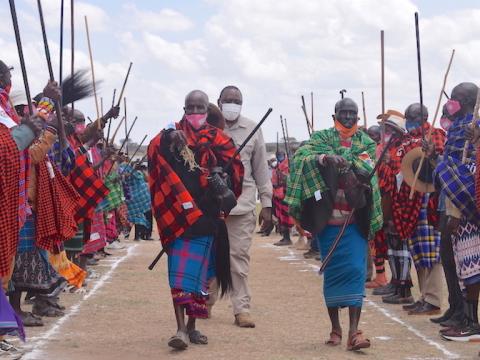Elders make historic declaration to end FGM and child marriage in Kenya

By Sarah Ooko, World Vision Senior Communications & Media Officer, Kenya
As a child of only 11 years, Jacinta was forced to undergo Female Genital Mutilation (FGM) by her parents.
She was later married off to an older man who provided dowry, in form of goats, to her father. This made her dad happy as the goats increased his wealth.
Jacinta had no choice in the matter. Her father, with the approval of community elders, went ahead and subjected her to the cut, without consulting her.

This decision changed her life completely. As a result of being married at such a young age, Jacinta went through a very difficult pregnancy and experienced massive tears and bleeding during delivery.
"I was in so much pain and could not get out of my bed for over two months. I have had to deal with reproductive health challenges since then, which has not been easy," states the now 50-year-old Jacinta.
She is among the many women that are living with life-long consequences of FGM and child marriage, which are among the retrogressive cultural practices that are still rife in some parts of Kenya.

The male community elders, who are the custodians of these cultural practices, have for a long time perpetuated these acts.
But the tides are slowly changing. Recently, male elders drawn from Kenya's FGM and child marriage hotspots made a declaration to put an end to both practices.
The elders were drawn from the Pokot and Samburu community, where the prevalence of FGM is 94 percent and 95 percent respectively, based on statistics from UNICEF.
The declaration made by the Samburu elders, was presided over by the President of Kenya, Uhuru Kenyatta, in March 2021.

This followed an earlier declaration made in February 2021 by Pokot elders from both Kenya and Uganda, which was presided over by senior government officials from both countries.
"The two countries border each other. So, we used to have many cases of families choosing to evade the stringent laws in Kenya by ferrying their children to Uganda to undergo FGM in preparation for early marriage," notes George Ndung'u, the Gender and Development Expert for World Vision in Kenya.

World Vision contributed immensely to the realisation of these historic declarations through its community dialogue initiatives and sensitisation forums that have changed the mind-sets of elders and empowered them to become child right champions.
As the custodians of culture in the Pokot and Samburu communities, where FGM and child marriage are common, the elders’ declaration will go a long way in protecting children from these acts.
In these communities, it is the male elders that promote the harmful practices, and consider them as milestones in the lives of women and girls.

The elders are also the ones who benefit from the dowry (in form of cattle) that is given in exchange, once a girl has been circumcised and married off.
Men have also been socialised to view circumcised women as beautiful and worthy for marriage, compared to those that have not undergone the cut.
As such, the elders’ declaration will contribute immensely to the end of FGM and child marriage in Kenya.

Having experienced the adverse health effects and psychological torture linked to these retrogressive cultural practices, Jacinta notes that the elders’ declaration gives hope for a brighter future for women and girls.
"Girls in affected communities now have an opportunity to go to school and pursue their desired career goals and life dreams without fearing that their aspirations will be cut short by these harmful cultural practices," she says.

Jacinta is among the many anti-FGM champions empowered by World Vision in Kenya, who are committed to sensitising communities on the adverse effects of FGM and child marriage so to expedite their eradication.
"This is a cause that is dear to me, because I don’t want any girl to experience what I went through. I noticed that due to the silence, men and elders in our community were not aware of the effect that these harmful practices have on girls and women. My testimony, as well as those of other women that went through the cut, really helped to change the thinking around these issues among our elders. I am glad that they have now joined us in the fight against FGM and child marriage,” she says.